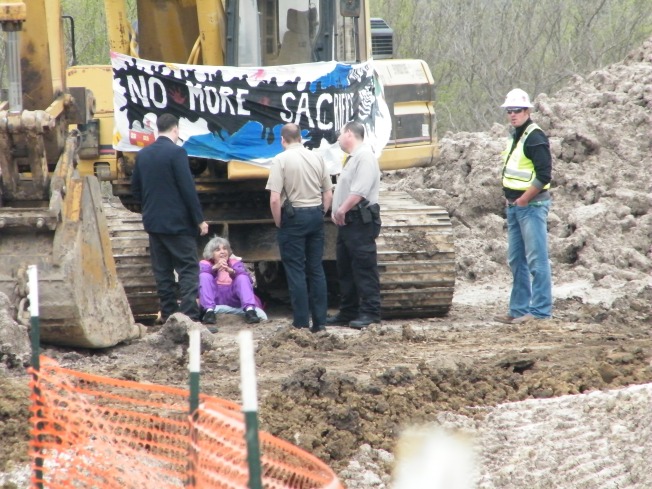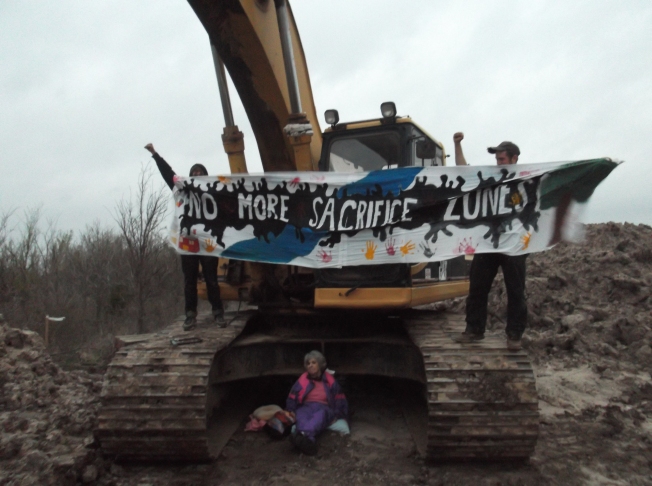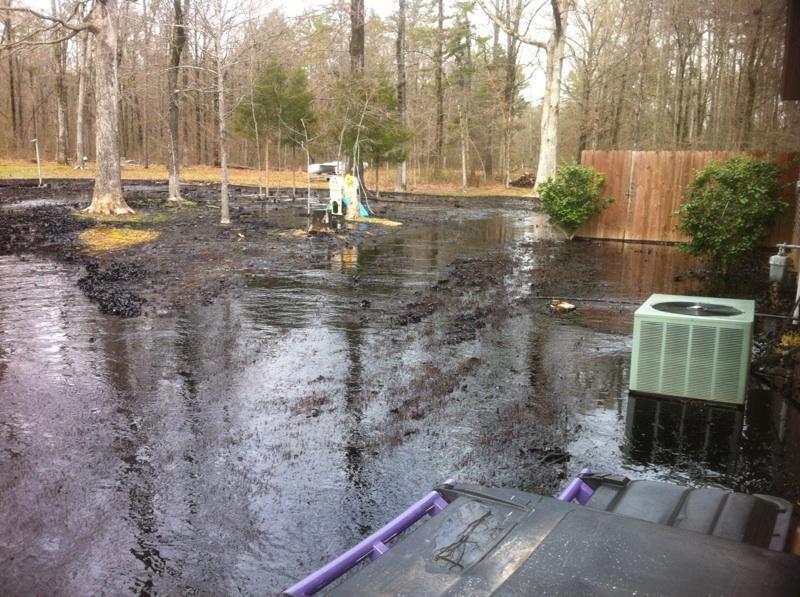Oklahoma Grandmother Locks Herself to Keystone XL Heavy Machinery — Halts Construction
_________________________________________________________________________________
__________________________________________________________________________________
 UPDATE- 10:30am Nancy Zorn has been extracted by local law UPDATE- 10:30am Nancy Zorn has been extracted by local enforcement and taken into custody. Please consider contributing to Nancy’s bail fund.
UPDATE- 10:30am Nancy Zorn has been extracted by local law UPDATE- 10:30am Nancy Zorn has been extracted by local enforcement and taken into custody. Please consider contributing to Nancy’s bail fund.
_________________________________________________________________________________________
ALLEN, OK – Tuesday, April 9, 2013, 9:00 AM – Oklahoma grandmother Nancy Zorn, 79, from Warr Acres, has locked herself to a piece of heavy machinery effectively halting construction on TransCanada’s Keystone XL toxic tar sands pipeline. This action comes in the wake of the disastrous tar sands pipeline spill in Mayflower Arkansas, where an estimated 80,000 gallons of tar sands spilled into a residential neighborhood and local waterways.
Using a bike-lock Zorn has attached her neck directly to a massive earth-mover, known as an excavator, which has brought construction of Keystone XL to a stop. Zorn is the second Oklahoma grandmother this year risking arrest to stop construction of the pipeline, and her protest is the third in a series of ongoing civil disobedience actions led by the Oklahoma-based coalition of organizations, Great Plains Tar Sands Resistance.
“Right now our neighbors in Arkansas are feeling the toxic affect of tar sands on their community. Will Oklahoma neighborhoods be next?” asked Zorn before taking action today. “I can no longer sit by idly while toxic tar sands are pumped down from Canada and into our communities. It is time to rise up and defend our home. It is my hope that this one small action today will inspire many to protect this land and our water.”
Exxon Mobil’s recent Pegasus pipeline spill has forced local residents to evacuate their homes due to life-threatening toxins released into their neighborhood. Local families have experienced episodes of nausea, headaches, and respiratory problems due to acute exposure to deadly chemicals, like benzene, that are mixed in with the raw tar sands. Pegasus was carrying up to 90,000 barrels of tar sands a day before it ruptured and spilled. The Keystone XL pipeline is slated to carry over 800,000 barrels a day; an alarming 10 times the amount of tar sands.
“In the last two weeks alone there have been at least six different inland oil spills across the country,” said Eric Wheeler, an Oklahoma native and spokesperson for Great Plains Tar Sands Resistance. “It’s time to stop referring to pipeline spills as accidents, it’s now abundantly clear that leaks are just part of business as usual. Tar sands hurt everyone they touch, from the indigenous communities in Alberta whose water is being poisoned, to the Gulf Coast communities that are forced to breathe toxic refinery emissions. We’re not going to allow this toxic stuff in our beautiful state.”
Arkansas Residents Evacuate as Exxon-Mobil Tar Sands Pipeline Ruptures
An Exxon-Mobil oil pipeline ruptured Friday afternoon in the town of Mayflower, Arkansas, forcing the evacuation of 20 homes and shutting down sections of interstate highway. According to Little Rock’s KATV, a hazardous materials team from the Office of Emergency Management has contained the spill and is currently attempting a cleanup.
The burst pipe is part of the Pegasus pipeline network, which connects tar sands along the Gulf coast to refineries in Houston. Thousands of gallons of crude oil erupted from the breach around 3:00 p.m. on Friday, spilling through a housing subdivision and into the town’s storm drainage system, fouling drainage ditches and shutting down Highway 365 and Interstate 40.
Residents were evacuated to avoid health hazards from crude oil fumes and to keep stray sparks from igniting the standing oil. Emergency workers contained the spill by hastily constructing earthen dams.
Exxon-Mobil reportedly has a crew investigating the accident. The company released a statement Friday that read, in part, “We are working with emergency responders and local authorities to respond to the incident and are establishing an information line for community support. We regret that this incident has occurred and we apologize for any disruption or inconvenience this has caused.”
The Arkansas Oil and Gas Commission told Channel 7 News that, as an interstate pipeline, Pegasus has no local control, oversight or inspection. Only federal officials from the Pipeline and Hazard Material Safety Administration are authorized to inspect and maintain the pipeline.
Watch video about this story, embedded below via KATV:
>
(hat-tip to Crooks and Liars)
story copied from the raw story



